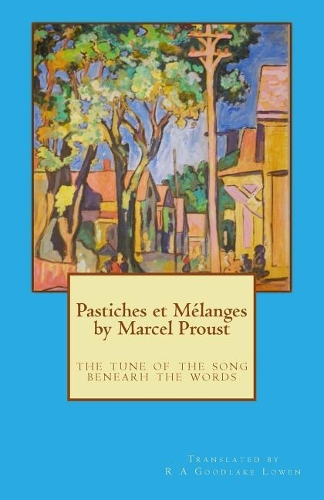
Pastiches et Melanges by Marcel Proust
Series: European Cultural History
This is the first translation into English in its entirety of Marcel Proust's Pastiches et Mélanges, published by Gaston Gallimard in 1919. The first part, Pastiches, contains nine literary parodies about a fraudster, Henri Lemoine, who claimed to be able to manufacture diamonds. The pastiches are in the manner of Balzac, Flaubert, Sainte-Beuve, Henri de Régnier, Michelet, Émile Faguet, Renan and
NaN
VOLUME
English
Paperback

This is the first translation into English in its entirety of Marcel Proust's Pastiches et Mélanges, published by Gaston Gallimard in 1919. The first part, Pastiches, contains nine literary parodies about a fraudster, Henri Lemoine, who claimed to be able to manufacture diamonds. The pastiches are in the manner of Balzac, Flaubert, Sainte-Beuve, Henri de Régnier, Michelet, Émile Faguet, Renan and the Goncourt brothers. The second part, Mélanges, consists of four sections: the destruction of cathedrals in the First World War, the separation of church and state, a drama about madness, and Proust's love of reading. Proust is best known for writing À la recherche du temps perdu (variously translated as Remembrance of Things Past and In Search of Lost Time), widely considered to be the greatest novel of the twentieth century. The Melody beneath the Words is the first translation into English in its entirety of Marcel Proust's Pastiches et Mélanges, published by Gaston Gallimard in 1919. The first part, Pastiches, contains nine literary parodies about a fraudster, Henri Lemoine, who claimed to be able to manufacture diamonds. The pastiches are in the manner of Balzac, Flaubert, Sainte-Beuve, Henri de Régnier, Michelet, Émile Faguet, Renan and the Goncourt brothers. The second part, Mélanges, consists of four sections: the destruction of cathedrals in the First World War, the separation of church and state, a drama about madness, and Proust's love of reading. Proust is best known for writing À la recherche du temps perdu (variously translated as Remembrance of Things Past and In Search of Lost Time), widely considered to be the greatest novel of the twentieth century. The Melody beneath the Words is the first translation into English in its entirety of Marcel Proust's Pastiches et Mélanges, published by Gaston Gallimard in 1919. The first part, Pastiches, contains nine literary parodies about a fraudster, Henri Lemoine, who claimed to be able to manufacture diamonds. The pastiches are in the manner of Balzac, Flaubert, Sainte-Beuve, Henri de Régnier, Michelet, Émile Faguet, Renan and the Goncourt brothers. The second part, Mélanges, consists of four sections: the destruction of cathedrals in the First World War, the separation of church and state, a drama about madness, and Proust's love of reading. Proust is best known for writing À la recherche du temps perdu (variously translated as Remembrance of Things Past and In Search of Lost Time), widely considered to be the greatest novel of the twentieth century.About the Author: R A Goodlake Lowen was educated in England where he obtained a master's degree from the University of Cambridge. He and his wife Jennifer spent thirty years in Canada, after which they returned to England where they now divide their time between Grimsby, Lincolnshire and Leek, Staffordshire.
Price Comparison [India]
In This Series
Bestseller Manga
Trending NEWS




















